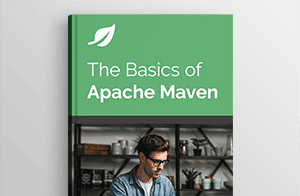Let's get started with a Microservice Architecture with Spring Cloud:
Single Responsibility Principle in Java
Last updated: May 3, 2020
1. Overview
In this tutorial, we’ll be discussing the Single Responsibility Principle, as one of the SOLID principles of object-oriented programming.
Overall, we’ll go in-depth on what this principle is and how to implement it when designing our software. Furthermore, we’ll explain when this principle can be misleading.
*SRP = Single Responsibility Principle
2. Single Responsibility Principle
As the name suggests, this principle states that each class should have one responsibility, one single purpose. This means that a class will do only one job, which leads us to conclude it should have only one reason to change.
We don’t want objects that know too much and have unrelated behavior. These classes are harder to maintain. For example, if we have a class that we change a lot, and for different reasons, then this class should be broken down into more classes, each handling a single concern. Surely, if an error occurs, it will be easier to find.
Let’s consider a class that contains code that changes the text in some way. The only job of this class should be manipulating text.
public class TextManipulator {
private String text;
public TextManipulator(String text) {
this.text = text;
}
public String getText() {
return text;
}
public void appendText(String newText) {
text = text.concat(newText);
}
public String findWordAndReplace(String word, String replacementWord) {
if (text.contains(word)) {
text = text.replace(word, replacementWord);
}
return text;
}
public String findWordAndDelete(String word) {
if (text.contains(word)) {
text = text.replace(word, "");
}
return text;
}
public void printText() {
System.out.println(textManipulator.getText());
}
}Although this may seem fine, it is not a good example of the SRP. Here we have two responsibilities: manipulating and printing the text.
Having a method that prints out text in this class violate the Single Responsibility Principle. For this purpose, we should create another class, which will only handle printing text:
public class TextPrinter {
TextManipulator textManipulator;
public TextPrinter(TextManipulator textManipulator) {
this.textManipulator = textManipulator;
}
public void printText() {
System.out.println(textManipulator.getText());
}
public void printOutEachWordOfText() {
System.out.println(Arrays.toString(textManipulator.getText().split(" ")));
}
public void printRangeOfCharacters(int startingIndex, int endIndex) {
System.out.println(textManipulator.getText().substring(startingIndex, endIndex));
}
}Now, in this class, we can create methods for as many variations of printing text as we want, because that’s its job.
3. How Can This Principle Be Misleading?
The trick of implementing SRP in our software is knowing the responsibility of each class.
However, every developer has their vision of the class purpose, which makes things tricky. Since we don’t have strict instructions on how to implement this principle, we are left with our interpretations of what the responsibility will be.
What this means is that sometimes only we, as designers of our application, can decide if something is in the scope of a class or not.
When writing a class according to the SRP principle, we have to think about the problem domain, business needs, and application architecture. It is very subjective, which makes implementing this principle harder then it seems. It will not be as simple as the example we have in this tutorial.
This leads us to the next point.
4. Cohesion
Following the SRP principle, our classes will adhere to one functionality. Their methods and data will be concerned with one clear purpose. This means high cohesion, as well as robustness, which together reduce errors.
When designing software based on the SRP principle, cohesion is essential, since it helps us to find single responsibilities for our classes. This concept also helps us find classes that have more than one responsibility.
Let’s go back to our TextManipulator class methods:
...
public void appendText(String newText) {
text = text.concat(newText);
}
public String findWordAndReplace(String word, String replacementWord) {
if (text.contains(word)) {
text = text.replace(word, replacementWord);
}
return text;
}
public String findWordAndDelete(String word) {
if (text.contains(word)) {
text = text.replace(word, "");
}
return text;
}
...Here, we have a clear representation of what this class does: Text manipulation.
But, if we don’t think about cohesion and we don’t have a clear definition of what this class’s responsibility is, we could say that writing and updating the text are two different and separate jobs. Lead by this thought, we can conclude than these should be two separate classes: WriteText and UpdateText.
In reality, we’d get two classes that are tightly coupled and loosely cohesive, which should almost always be used together. These three methods may perform different operations, but they essentially serve one single purpose: Text manipulation. The key is not to overthink.
One of the tools that can help achieve high cohesion in methods is LCOM. Essentially, LCOM measures the connection between class components and their relation to one another.
Martin Hitz and Behzad Montazeri introduced LCOM4, which Sonarqube metered for a time, but has since deprecated.
5. Conclusion
Even though the name of the principle is self-explanatory, we can see how easy it is to implement incorrectly. Make sure to distinguish the responsibility of every class when developing a project and pay extra attention to cohesion.
The code backing this article is available on GitHub. Once you're logged in as a Baeldung Pro Member, start learning and coding on the project.

















